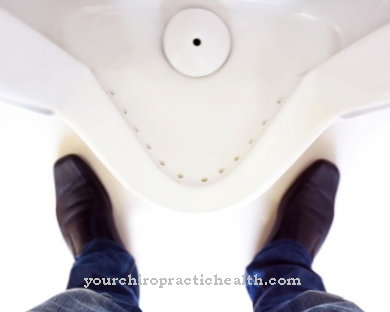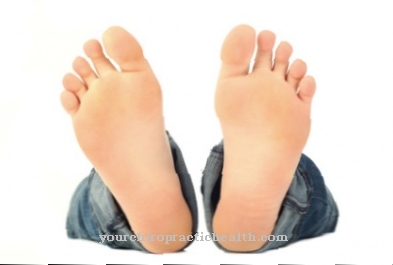Swollen legs are a common problem. Usually in the evening the ankles or the whole leg swell, it feels tired and heavy. Both women and men are affected.
What are swollen legs?

Rarely do you think about what caused the swollen legs; usually fat and tired legs are accepted as the result of a busy day. But the question of the reason is very important, because the cause of swollen legs can be a serious illness.
Swollen legs are caused by the accumulation of water in the tissue (edema). This water escapes from the vascular system of the legs and is deposited in the surrounding tissue. The amount of fluid is greater than the body is able to break down and this creates swelling.
Edema does not only occur on the legs but can occur anywhere in the body, depending on the disease. Swollen legs indicate a disorder that either affects the venous system itself or has an effect on the venous system.
causes
Swollen legs develop when the pressure between blood vessels and tissue changes. On the one hand, this can happen through overload, through long periods of sitting or standing, through lack of movement, but also through the genetic predisposition of the weak veins.
During pregnancy, swollen legs are caused by an altered hormone balance. However, swollen legs are also triggered by certain diseases and should therefore be examined by a doctor in any case.
Heart diseases such as heart failure (heart failure) or a heart valve defect have swollen legs as a typical symptom. Vascular occlusions or vascular inflammation also cause swollen legs. Edema is also caused by certain medications, such as cortisone.
You can find your medication here
➔ Medicines against edema and water retentionDiseases with this symptom
- Kidney weakness
- Pulmonary embolism
- Heart failure
- Myocarditis
- Vein weakness
- Progressive systemic scleroderma
- Inflammation of the kidneys
- Acute kidney failure
- Cirrhosis of the liver
- Hormone fluctuations
- Drug allergy
- Pleural effusion
Diagnosis & course
Swollen legs should definitely be examined by the doctor to find out whether there is an underlying disease, whether the veins are abnormally changed or whether there are other causes for the swelling.
Both the patient's medical history and the history of the occurrence of swollen legs are important. For a diagnosis, the external appearance of the legs must first be considered, because varicose veins or skin varicose veins, so-called spider veins, are an indication of a venous disease.
A typical and very simple test is to press on the swollen tissue with your finger. If a dent remains for a while, this is an indication of water retention. Furthermore, ultrasound examinations and a venography, i.e. vein examination using injected contrast medium, provide more detailed information about the condition of the veins.
If the pathological changes are not treated, they will always progress and the symptoms can worsen. If left untreated, swollen legs can lead to open legs, thrombosis or even embolism.
Complications
Various complications can arise from leg swelling.
If swollen legs are not properly treated and cared for, open areas can arise (necrosis, ulcus cruris / open leg and gangrene). The wounds do not heal well due to decreased blood flow. It may even have to be operated on; in the worst case, an amputation is unavoidable.
If swollen legs are due to venous disorders, there is a risk of thrombosis because the blood flows slowly. In the case of a thrombosis, a blood clot blocks the blood vessel and the vein can no longer properly dispose of the tissue. There is further swelling as the blood takes other routes and thus overloads other veins. The affected extremity may turn brown or bluish and the tissue hardens. The blood circulation remains disturbed. Varicose veins often form, which in rare cases can burst. As a result, there can be a great deal of blood loss. In addition, water retention in the tissue (edema) can occur.
If the thrombus in the vein wall becomes detached, it can lead to a stroke, heart attack, or pulmonary embolism. In a pulmonary embolism, the detached thrombus is washed into the lungs with the bloodstream. The heart suddenly becomes overloaded and there is a risk of cardiac arrest. More severe pulmonary embolisms often lead to immediate death.
When should you go to the doctor?
If your legs are swollen, it may be due to a lack of exercise or extremely warm weather. Another common cause of swollen legs is standing or sitting for long periods during the day. Such symptoms are so-called physiological edema, which regress again overnight. In addition, preventive measures against such water retention in the legs help - for example, compensatory gymnastics, cycling, treading water or putting your feet up. However, if this is clearly not the case, anyone with leg swelling should see their doctor immediately.
There are numerous possible causes of leg swelling, including several serious conditions that require urgent treatment. These include, for example, various heart diseases, high blood pressure, kidney problems, thyroid disorders, diabetes mellitus or liver diseases. Swollen legs can also result from chronic circulatory disorders and congestion of the lymphatic fluid. Legs can swell during pregnancy as well. In addition to his examination methods, the attending physician will inquire about any medication that may have swollen legs as a side effect.
Swollen legs often cause a lot of suffering in those affected. The unsightly appearance, the restricted mobility caused by the swollen legs and possible pain can lead to depression in the patient. He should then speak to his treating doctor directly about this.
Doctors & therapists in your area
Treatment & Therapy
First of all, the patient himself can contribute a lot to an improvement. Swollen legs should be cooled and raised. Elevation allows excess fluid to drain away, reducing swelling. At night, those affected should always keep their legs high. Long periods of standing or sitting should also be avoided during the day.
Alternating showers provide relief, as do diuretics, which are dehydrating drugs, and lymphatic drainage. If there is a genetic weakness in veins, special vein gymnastics is recommended. It mainly trains the calf muscles, which are used to pump the blood back towards the heart. Sports such as hiking, Nordic walking, cycling or swimming help with swollen legs.
Compression stockings are also recommended. These are specially adapted and exert pressure on the venous system, which leads to the vessels being constricted and thus the venous valves to close better again. The metabolism in the legs also works better as a result, which counteracts swollen legs.
There are four different classes of compression stockings, they differ in the strength of the material and thus in the pressure they exert on the fabric. Finally, there is still the option of surgically treating the veins so that they no longer cause swollen legs.
Outlook & forecast
The reason for swollen legs is usually the retention of water in the tissue. If this retention of water is not treated, the legs will swell more intensely. The skin is stressed and stretched. She is then very sensitive to touch. Even light bumps can damage the skin. It can burst open easily, which leads to wound formation. These wounds must then be treated carefully so that there are no infections and so that these wounds heal as quickly as possible.
In addition, the patient's freedom of movement is restricted. Walking is also painful because the legs feel heavy and the skin is uncomfortably tight.
Using anti-drainage drugs called diuretics can help prevent swollen legs from developing. They should not be taken regularly as they can lead to various side effects related to the patient's water balance. Taking such medication then leads to an increased urge to urinate in order to flush the excess water out of the body.
The regular occurrence of swollen legs can indicate various organ damage, such as damage to the kidney. This circumstance should urgently be examined and assessed by a doctor.
You can find your medication here
➔ Medicines against edema and water retentionprevention
To prevent swollen legs, it is advisable to avoid standing and sitting for long periods of time, moving frequently and drinking enough. Instead of taking the elevator, you should walk up the stairs or take a stroll from time to time. Cycling is good training for healthy veins, and a healthy diet is also preventative. Excess alcohol should be avoided.
You can do that yourself
Swollen legs and feet are often caused by long periods of standing and sitting. Elevating the legs provides relief and should be repeated as often as possible. Anyone who works in sales and cannot avoid standing for a long time should change their position as often as possible. Nevertheless, water retention in the legs must be examined medically, as they can indicate kidney and heart problems or lipedema.
Strong leg veins promote the return of blood to the heart so that less water can accumulate. This can be promoted, for example, with vein stockings. Regular leg exercises also support the muscles and strengthen the veins. Deep abdominal breathing also strengthens the reflux mechanism. The alternation between inhaling and exhaling creates a negative pressure that stimulates the blood circulation and facilitates the drainage of water. Since the problem is exacerbated when heated, cool compresses will help. Basically, staying in the sun should be avoided.
Being overweight increases existing ailments, so weight reduction is recommended. Kneipp pours and treading water have also proven to be successful. Cold water has a decongestant effect and can strengthen the veins. Exercise is always good and reduces water retention in the legs. Competitive sport is not required for this. Stress can exacerbate the problem, so relaxation exercises, plenty of sleep and a balanced diet are recommended.



























